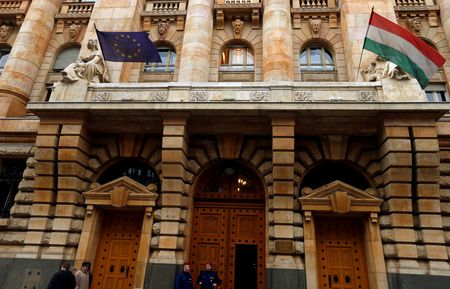 1
1 1
1
By Gergely Szakacs
BUDAPEST (Reuters) – The National Bank of Hungary is expected to leave its base rate steady at 13% at next Tuesday’s policy meeting, where the bank has flagged a cut in the top of its interest rate corridor, citing a reduction in market risks.
With many economists saying inflation in central Europe has peaked, Deputy Governor Barnabas Virag’s flagging of the narrowing of the interest rate corridor used by Hungarian policymakers could set the stage for what would be the region’s first rate cut since 2021.
Virag said a cut in the bank’s 25% top collateralised loan rate next week would be part of a “multi-step process” towards policy normalisation.
All 14 economists in an April 17-21 Reuters poll said the NBH would leave the European Union’s highest base rate unchanged at 13% next week, pencilling in cuts worth 200 basis points by the end of the year.
Last October, the bank also launched a one-day deposit with an 18% interest rate, which over the past half-year has helped lift the forint from all-time lows of around 430 to the euro.
“We expect that the (Monetary Council) may lower the upper edge closer to the 18% effective rate,” Citigroup economist Eszter Gargyan said.
“Changes in the o/n deposit rate may only follow in May, at the earliest. Markets will be eyeing any hints about the timing of the first cut in the MPC statement and subsequent briefing.”
The forint traded at around 377-378 per euro on Friday, off one-year-highs hit on Tuesday and some 2% weaker since the central bank’s surprise announcement.
The NBH has said the latest inflation data – showing a headline rate above 25% – was in line with expectations. ING economists said the size of next week’s cut in the top of the bank’s rate corridor would depend on moves in the forint.
“Should we see stability in the currency after the sell-off ignited by the dovish remarks, we might see a bold move of a 700bp cut,” ING said.
“With that, the overnight repo rate would match the 18% effective rate, suggesting that from now on, the only way is down for effective rates.”
(Reporting by Gergely Szakacs; Editing by Gareth Jones)